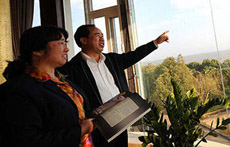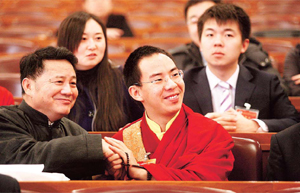Voice from London
(chinadaily.com.cn)
Updated: 2010-03-02 13:37
The Times: Wen Jiabao unveils increased social and rural spending for China 05/03
China congratulated itself today on its escape relatively unscathed from the global financial crisis but warned against complacency and vowed the poor would not be forgotten in its economic advance.
In his annual "state of the nation" address to the opening session of the National People's Congress, the rubber-stamp parliament, Premier Wen Jiabao drew thunderous applause from the nearly 3,000 deputies when he said China's economy had been the first in the world to turn around.
But the premier's two hour speech was imbued with his traditional conservatism rather than triumphalism.
In a speech that was a laundry list of every problem the government faces and every progress it has achieved, Mr Wen devoted several sections to the hot topics of concern among his 1.3 billion people: soaring house prices, jobs, inflation and corruption.
Reuters:Wary China to steer steady course 05/03
China will steer a steady policy course this year but will change tack if needed to counter the lingering impact of the international credit crunch, Premier Wen Jiabao said on Friday.
Wen announced increases in social and rural spending that outstrip the planned rise in defense outlays, underscoring concern over the income inequalities that blight a country poised to pass Japan this year as the world's second-largest economy.
The economy grew 8.7 percent last year as a result, by far the fastest pace of any major country, but Wen played down the achievement.
"We must not interpret the economic turnaround as a fundamental improvement in the economic situation," Wen said in his "State of the Union" speech to nearly 3,000 delegates in the cavernous Great Hall of the People.
The Times: Beijing switches money from the military 04/03
China has reined in the rampant expansion of its military muscle. Its declared defense budget, revealed yesterday, will grow 7.5 per cent this year, its slowest rate for two decades.
The slower growth in spending surprised international analysts who had forecast a rise in the region of 14.5 per cent, slightly less than last year.
Tai Ming Cheung, at the University of California San Diego's School of International Relations and Pacific Studies, said that despite recent US military equipment sales to Taiwan, China's more restrained spending could reflect better relations with the autonomous island, which China claims as part of its own territory.
"There has been an improvement in cross-strait relations and a reduction in security tensions so they may offer this as a token olive branch," he said.


